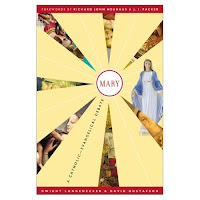 When my friend lent me Mary—A Catholic-Evangelical Debate by Dwight Longenecker and David Gustafson, I was still a bit dubious about where I was at with Catholic beliefs about Mary. I brought the book home, stuck it in my “to read” pile, and there it sat for about a year. Then our friends came to visit us for Sunshine’s baptism, and we planned a visit to Saskatchewan for their daughter’s baptism. It was about time to return the book, so I dusted it off and started reading.
When my friend lent me Mary—A Catholic-Evangelical Debate by Dwight Longenecker and David Gustafson, I was still a bit dubious about where I was at with Catholic beliefs about Mary. I brought the book home, stuck it in my “to read” pile, and there it sat for about a year. Then our friends came to visit us for Sunshine’s baptism, and we planned a visit to Saskatchewan for their daughter’s baptism. It was about time to return the book, so I dusted it off and started reading.
Mary—A Catholic-Evangelical Debate is a discussion between a Catholic and an Evangelical about what they each believe about Mary. Dwight is a Catholic convert who tracked down his old university buddy David to talk about Mary. Their discussion is informative and interesting, as each explains their own position on Mary and why they disagree with the other—or where they manage to find agreement.
Since reading it, I’ve found myself wondering what I would have thought if I’d read this book a few years ago. I’ll never know that answer. Yet even I was surprised at how much I found myself agreeing with Dwight’s statements and questioning David’s statements. Mary is one of the topics that Protestants find the hardest to swallow. It was probably the only area that raised questions for me when I was reading the Catechism while dating my husband. Though my husband’s answers settled most of my questions, I remained a bit dubious about Mary. Others could pray the rosary and exercise Marian devotion; I’d just accept what the Church taught about her, but it didn’t have to affect my daily life.
Throughout the book, Dwight challenges David to go deeper into his faith by exploring what Mary means to the church. Dwight kept saying that Mary always points us to her son, Jesus. Like any mother, she wants Him to get all the attention and adoration. And while Dwight admitted that some Catholics take this further than others—and that some Catholics perhaps even take it too far—I agree that Catholic understanding of Mary enriches our understanding of Jesus, the Church, and God’s plan in history.
The book held a couple surprises for me. First was how early so many of the teachings and dogmas of the church were developed. Within a few centuries after Jesus, theologians were already teaching most of what the Church teaches today, even about Mary. Since many of these doctrines are complicated and complex, I somehow thought that it would have taken much more thinking, prayer and debate to develop them. Second was the fact that most of the reformers, including Luther and Calvin, held onto what the Church taught about Mary. While they had a few issues with other things going on in the Church, they didn’t have any questions about Marian doctrine.
Overall, I found Mary—A Catholic-Evangelical Debate an excellent resource on Mary. Neither Dwight nor David was trying to “win” the debate; rather, they just wanted to share what they believed and to understand each other’s faith better. And since I think one of the greatest divisions between Catholics and Protestants is merely a misunderstanding what the other believes, I really appreciated and enjoyed this book.

One Response
Sounds like a book I’d like to read! Where did you pick up your copy?